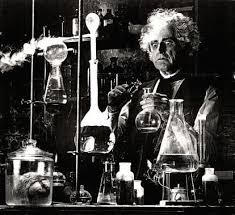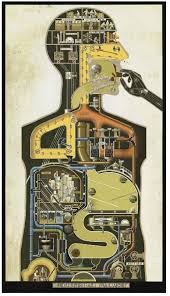General notes on science & the ideology of objectivism
“graves and tombstones where flowers should be,
And Priests in white gowns
were walking their rounds,
genetically modifying with wires
our joys and desires”
 This is a very general text originally designed to clarify things for myself in my own words; it obviously needs to be elaborated more concretely in relation to things such as modern eugenics, cloning, GMOs, etc
This is a very general text originally designed to clarify things for myself in my own words; it obviously needs to be elaborated more concretely in relation to things such as modern eugenics, cloning, GMOs, etc
(other texts on aspects of science on this site: here, here, here, here, here, here and here )
The main problem with the ideology of science is that it claims to not be ideological – it claims to be “objective”.
Originally, in its struggle with feudalism, religion and superstition, science had something vaguely progressive about it. Understanding reality was no longer a matter of faith or fantasy but something that had to be subject to trial and error and varying degrees of evidence and proof. Moreover, from the Industrial Revolution onwards, in its development of technology science, as a method of hierarchical domination, had a clearly far more rapid and more visible material influence than religion had in the virtually static pre-capitalist societies. Thus it was probably the main factor in showing to the world that it is human activity that makes history (even if it was mainly the activity of a small minority), rather than your life being a God-given role. But it reduced, and still reduces, its method of “trial and error” from the social terrain as a whole to the examination and manipulation of nature, things and human beings reduced to their animal, biological components separated from their history, from their choices and desires within a specific social environment. Individuals are reduced to their predictable measurable biological functions, in particular those they have in common with animals, and often simply reduced to their cell structure. Thus they adopt the self-same mentality of those they serve – the capitalists who reduce the masses of individuals to commodities, to exchangeable and/or comparable equivalents. “Sociobiology…sees life…as the maximisation of genetic inheritance, on the economic model of the maximisation of capital; the modelling used by sociobiology is in fact copied from that of economics…it considers individuals as negligible quantities, simple supports for a genetic inheritance whose maximisation they must ensure” (André Pichot, The Pure Society )
And just as the powers-that-be like to present their own separate self-interest as the general interest, so scientists also claim that their own personal interest has nothing to do with their activity.
 Scientists’ appeal to “objectivity” hides the fact that the choice of their profession and its status and the tradition of this narrow focus was a subjective choice, and one conditioned by, amongst other things, the dominant separation of intellect from the emotions: the emotions are either considered purely subjective and thus useless, or religion is accepted by default as the carrier of these emotions.
Scientists’ appeal to “objectivity” hides the fact that the choice of their profession and its status and the tradition of this narrow focus was a subjective choice, and one conditioned by, amongst other things, the dominant separation of intellect from the emotions: the emotions are either considered purely subjective and thus useless, or religion is accepted by default as the carrier of these emotions.
Thus Einstein said, “Science without religion is lame, religion without science is blind” and Nikola Tesla, the man most associated with the development of the Alternating Current, said “There is no conflict between the ideal of religion and the ideal of science, but science is founded on fact. To me, the universe is simply a great machine…Man, like the universe, is a machine”.
So, behind this objectivism, becoming a scientist is a subjective choice not just for its financial rewards but, above all, a choice utterly submissive to the dominant reification of human beings, their reduction to a machine, to their role within the commodity economy which demands the repression of subjective desire, which demands their reduction to a functional machine within the overall process of exploitation and capital accumulation. Trial and error reduced to the fetishism of examining cells or natural elements, separating them, re-combining them, comparing and contrasting them, outside of their usual (natural or social) context, in a lab, narrowed such experiments to what is acceptable to quantifiable capitalist social relations. This is not to rule out in advance the possible use in a non-capitalist society of such methods amongst others; the point is not to fetishise this methodology and to valorise it as “objective”. For one thing, several discoveries have been made in the “scientific world” without such a methodology, discoveries made by accident (e.g penicillin). But more importantly, it’s fetishised by ignoring – or even hiding – its goals, and in this way tends to become a reified methodology reducing examination of things as if things existed separate from human needs and desires. Yet it’s not an innately reified methodology, any more than a recipe is – however, one would think someone was mad if they only cooked from strictly defined recipes, only cooked so as to feed armies, refused to provide anything that wasn’t cooked, cooked only in a sterile environment and thought cooking was the only form of experimentation.
 “Though we can be almost certain that no scientist would dare to treat a man today as he treats rabbits, nevertheless there remains the fear that scientists as a body, if permitted to do so, might submit living men to scientific experiments, doubtless less cruel but none the less disastrous to their human victims. If scientists cannot perform experiments on the bodies of individuals, they are eager to perform such experiments on the collective body, and it is in this that they must unconditionally be stopped. In their present organisation the monopolists of science, who as such remain outside of social life, undoubtedly form a separate caste which has much in common with the caste of priests. Scientific abstraction is their God, living and real individuals their victims and they themselves the licensed and consecrated priests”
“Though we can be almost certain that no scientist would dare to treat a man today as he treats rabbits, nevertheless there remains the fear that scientists as a body, if permitted to do so, might submit living men to scientific experiments, doubtless less cruel but none the less disastrous to their human victims. If scientists cannot perform experiments on the bodies of individuals, they are eager to perform such experiments on the collective body, and it is in this that they must unconditionally be stopped. In their present organisation the monopolists of science, who as such remain outside of social life, undoubtedly form a separate caste which has much in common with the caste of priests. Scientific abstraction is their God, living and real individuals their victims and they themselves the licensed and consecrated priests”
– Bakunin, God and the State
The idea of the lab is to take away all unpredictable influences on what one is examining and to submit these for examination to controls purely determined by the scientists. That is, it pretends to eradicate all human subjective influence (as well as accidental arbitrary environmental influences that they hadn’t previously decided upon). This method of separation is considered “objective” because it seems to place the scientist outside what s/he’s examining. But such detachment – in abstracting things from the genuine wider reality in which they operate – also helps to deny any social consequence that may arise from the results of such research. Thus scientists hope to wash their hands of the use of their activity – whether it be Hitler’s eugenics programme for the mentally ill, the development of nuclear weapons and energy, the destruction of biodiversity by GMOs or the police function of DNA analysis.
Distanciation is necessary. The difference between the distanciation that scientists profess through what they consider “objective” and the distanciation needed to consciously choose what (in the immediate and long term) one wants and doesn’t want – to step back from this immediate in order to make a conscious choice – is that the scientist pretends that his/her “objectivity” is external to his/her needs and desires. S/he appeals to an external authority of some “objective” truth waiting to be discovered, an objective truth which in reality doesn’t exist outside of the needs and desires of different individuals within their specific historic context. But the external authority implied in this “objectivity” hides the fact that it is utterly compatible with the external authority of the masters of the economy. “Objectivity” is the scientists’ version of God, but unlike religious forms of hierarchy, it admits that it can sometimes be wrong but insists that its methodology is objective enough to constantly make progress and correct its mistakes, a justification for its constant series of errors in which yesterday’s theory is proved to be bullshit only to be changed to another bit of bullshit that tomorrow will be shown to be so. In this fashion, this Great External Object, unlike the theologies surrounding the notion of God, can claim to be a kind of undogmatic God, whose pretension is to accumulate knowledge “for its own sake”, as if the selection of what is to be studied/discovered/ subsequently used is neutral and not defined by who pays for it, nor defined by goals that are often deliberately made amorphous, as if knowledge could exist purely “for itself”. In this objectivist ideology, knowledge takes on the same mentality as commodity production: everything is process, with the goal generally undefined because to define the goal – capital accumulation – would give the lie to this pretension to “objectivity”. Rare, for example, are the instances of scientific research such as Margaret Thatcher’s before she entered politics when, as a chemist, she invented a means of doubling the mass of ice cream by inflating it with air so as to give the appearance of greater quantity, an invention very obviously serving the ice cream company which had invested in this research.
For those who want to be free, who strive to express their individuality by subverting the colonisation of their lives by commodity production and consumption, the desire to experiment, to test reality, can only make sense on the terrain of the totality of this society. Re-combining what is made and considered as separate is a social question, not something limited exclusively to a laboratory (or, as in the case of GMOs for example, using the world as a lab where everyone becomes unwilling guinea pigs). But for those attached to science, to the ideology of “objectivity” which accepts people as essentially predictable objects – or at least aims to make them so – to even consider such things is seen as “ideological”. Trapped within their career-choice they are as incapable of considering their activity as ideological as a fish is incapable of understanding water.
And whilst we are mentioning fish….The lamprey fish existed several million years before the dinosaurs, and still exist today. According to Darwinism this is because of “the survival of the fittest” (although in fact, it was Wallace, before Darwin’s “Origin of the Species”, who effectively coined this phrase). Unlike the dinosaurs, the lamprey survived the meteor bombardment because of their small size and the fact that they lived in the sea. The only way the lamprey could be seen as “fitter” than the dinosaurs (and – on present trends – far fitter than human beings) is because they survived – but then “the survival of the fittest” is a tautology in which the ability to survive is a synonym for being fit and being fit is a synonym for the ability to survive. Applying such a tautology to human beings would mean that the Jews and gypsies massacred by the Nazis were simply not fit enough, whereas those Nazis who survived were clearly fitter. But then any human (as opposed to “objective”) notion of “fit” would obviously reject such a sick absurdity. If Darwinists never recognise such contradictions it’s because – despite their capacity to combine things that “naturally” exist separately – they are incapable of applying such a capacity to the social terrain. For them, separation is as unquestioned and fundamental to their role as a Christian’s belief in God.
One might say that Darwin was merely being “objective” about the survival of the fittest – that he passed no value judgment on this “fitness”. However, his admiration for the obnoxious Malthus shows clearly the ideology behind such an apparently neutral observation – “Darwin considered that some of the competitors in Malthus’ perpetual struggle would be better equipped to survive. Those that were less able would die out, leaving only those with the more desirable traits. Through his research, Darwin concluded that this ongoing struggle between those more and less fit to survive would produce a never-ending progression of changes in the organism. In its simplest form, this is evolution through natural selection. ” Isn’t it significant that the subtitle of “The Origin of the Species” was “The preservation of favoured races in the struggle for life”? Racist imperialism given the ahistorical form of “natural selection”.
Mostly written in April 2017, slightly modified on 11/10/17, deleting some repetition, and also slightly modified in April 2018.
On the misery of scientists’ life
The following is taken from here, written in April 2011:
In the 6 months up until the beginning of March, there have been 3 suicides in just one building in Montpellier (south west France) of the internationally prestigious science organisation CIRAD (International Centre of Agricultural Research for Development…ie centre of research for the international development of surplus value and its utterly ruinous effects in particularly of the “third world” but also, obviously, elsewhere).
There are approximately 75 – 80 scientific research workers in this specific building amongst many on the Montpellier site. CIRAD is a particularly obnoxious enterprise: amongst other things, CIRAD is involved in research into, and development of, the scarily all-pervasive GMOs, (though these particular research workers weren’t involved in that). The 3 people worked for different research teams, but all in the same building: these deaths represent some 4% of the workforce in this building – considerably higher than the suicides at France Telecom or Renault, but the comparison is a bit dubious in some ways, since we’re only talking about one building here, and we very much doubt if this has been replicated in other buildings on the Montpellier site (we don’t know). Nevertheless, these suicides received no publicity (or at least so little that we never saw them) and it is only by chance that we have heard of them. After the last suicide the head of the team of the woman who died called everyone in to a ‘therapeutic’ post-trauma meeting, where, by sheer oversight, they forgot to mention the fact that the woman had had a blazing row with her manager during the day before the night she decided that enough was enough. Now, of course, a row with a manager does not necessarily lead to suicide, otherwise, 100s of 1000s of people would be overdosing or jumping off cliffs every single day in France and everywhere, but it can be the final straw in a world with seemingly no exit, a world which systematically isolates and humiliates people without end.
However, it should also be pointed out that scientific workers identify with their alienated labour far more so than, say, building workers or cleaners. This labour often involves horrendous professional shit with far more horrific consequences (e.g. GMOs) than most of the more obviously proletarianised salaried labour. Yet, for them the work is their identity, and if they have little else outside of this, for the most part, crap intellectual work then when that goes wrong, as it increasingly does nowadays, then it’s like their whole self falls apart. Science workers who passively accept their daily fate and daily work obliterate all sense of self in submission to an ideology of objectivity that’s simply the ideology of their masters. Experiment in pursuit of improving commodities and commodity society is the opposite of the dialectical so-called “science” of class struggle, the trial and error based on making new mistakes and correcting old ones, based on constantly testing reality, of which bourgeois science is simply a deformed parody. And the belief in the progressive civilising nature of this so-called objectivity compensates for the tortuous feeling of being an indifferent nothing (and it’s not for nothing that the young research worker who told us this is often ill and more exhausted than many other workers, though an unavoidable exhaustion is the lot of almost all proletarians nowadays). Subjectivity is considered the enemy of science, but in eradicating their desires and point of view they are thus pushed to a nothingness that reacts by seeking the false exit of resorting to suicide (not that this is the kind of thing they would have even begun to articulate in their suicide notes, of which we know nothing).
There is virtually no solidarity amongst these CIRAD workers (like the increasingly stressed cadres at Renault and France Telecom, who are dropping like flies). Many find their wages frozen and yet think they can do nothing about it. A hierarchy of teams are pitted against teams for resources and a corporatist identity with your own team prevails. A worker unable to use the single ventilator in his lab because it has to be shared, is forbidden – in the nicest possible way – to use a lab desk and ventilator in another team’s lab even though it’s hardly ever used: each team jealously guards its privileges and superior finances – its competitive separation – from the team lower in the hierarchy. And if you don’t belong to a team you’re really treated with, at best, indifference, but more often as the lowest of the low. As elsewhere, top management can spend 10s of 1000s on meals for potential financiers or for logo changes, but for 3 scraps of photocopy paper, they’ll hassle the manager, who’ll hassle the secretary, who’ll hassle the librarian, who’ll hassle the caretaker until it all falls onto the guy at the bottom who just needs to make some photocopies without the weight of the accumulated snowball of stress rolling down from on high. Some of these stresses have no direct capitalist logic to them: another pair of workers in a lab with just one ventilator are meant to mix dangerous chemicals, and take it in turns to use the ventilator so as not to breathe in the toxic fumes. If they complain, they’re told either not to work half the time – though they’ll still be paid – or to work by an open window. This is not much of an option in winter – it’s certainly been as cold as London this winter, and sometimes colder (this increasing uniformity of the weather is part of the Maastricht Treaty: the State, with its natural allies God and commodity-induced climate change, have decided that differences in the weather provide an unfair competitive edge between different regions of capital accumulation and so must be eliminated in the rush to ‘harmonisation’, to equivalence). The fact that they decide to work the half time that they are breathing in toxic fumes when they needn’t do so (and yet still would be able to collect their salary) says a helluva lot about the masochistic absence of a minimum of critique and refusal amongst those who apparently have a privileged position in the hierarchy of proletarianised middle class work. They like their work so much they’re willing to make themselves sick with it. “Science Macht Frei”. And this time, no need for bullets or cattle trucks: gas yourself because it’s all do-it-yourself nowadays – the autonomy of the submissive individual, their complicity in what kills them, saves Capital a lot of bother, which is bad for its image. Suicides are not good for capital’s image either – but they’re better than concentration camps, which are a form of death all too obviously organised by the State, and less capitalistically logical. Suicide is so much cleaner and cheaper, even if it has to be taboo: it’s the individual who is responsible – just another “free choice” in the buzzword of Thatcherite ideology and its monstrous off-shoots; the system under which we work and consume is of course, blameless. No, the belief that you can be what you want to be, the etiquette of self-determination, that you are in control, increasingly accepted in this increasingly individualist age, reduces choice to just surviving or suicide.
But it’s hard to feel sorry for some of these sad suicidal people, particularly the cadres (low to middle management) at Renault or France Telecom (it’s certainly not just cadres at these companies that have commited “the utlimate in self-criticism”, but there have been quite a few cadres that everyone is meant to pity when they hear the news on the telly, a hard thing to do when you’ve known so many people with so much more integrity than these cadres who’ve been constantly drawn to the edge ). Though we don’t know if GMO researchers have non-genetically modified their wrists or throats, we don’t give a toss if such obviously compromised cadres commit suicide or not. Many of them have a position in the hierarchical division of labour that involves thinking up and acting out ways of shitting on those below them in the hierarchy, all the worse when it’s done, like the madness of research and development of GMOs, in the name of benevolently feeding the starving: a kind of Christian Science missionary position that fucks those it claims to be liberating (GMOs destroy biodiversity, weaken the immune system, encourage the proliferation of carcenogenic pesticides and reduce human fertility). No leftist humanist concern for the plight of some of these cadres can hide the brutality of the function and result of their lucrative work. And you don’t have to be an embittered misanthrope to feel indifferent to the suicides of these particular workers (not that all of them fit this category by any means of course – but quite a few do). Some would say this is harsh. But who ever gave a toss about the guy who shot Che Guevara committing suicide a bit later? Or the guy who killed Harvey Milk topping himself a few years after (this is regardless of what you might think about these 2 politicians)? Or some nasty paedophile doing himself in because of the shame? And the results of these people’s nasty actions are certainly not as bad as that of those who develop GMOs (this is not some cynical provocation for provocation’s sake: we seriously believe this). And meanwhile, every 3 days there’s a suicide in French prisons that never gets even 1% of the publicity that Renault or France Telecom get (an anti-prison demo in Paris on Sunday March 28th, partly provoked by increasing prison suicides, saw half the demonstrators – 110 people – arrested in response to one person igniting a rescue flare, something that happens on virtually every demo and is considered part of the fun of it).
Renault’s and France Telecom’s responses to the bad publicity of the suicides in their companies was of course to make life so less stressful for the cadres who feel like ending it all (but never ending all their reified existence) – those damage-limitation PR exercises and pop psychological pep-talks make the professional workers feel so much better about life of course. Far far better than being provided with a massage or a free fuck for an hour before work, which of course would not have reduced the number of suicides at all. Why? Because such a “solution” , even if some inventive brainstorming session amongst these companies’ highly-paid think-tanks had come up with such an outrageous suggestion, would have been very bad PR in this PC age, and that’s what matters. The prohibitive cost, of course, would not have been a consideration. Because of course, providing a massage and/or fuck would have cost considerably less, since no-one would have been interested in it – whereas the uptake on the exhilarating offer of a chance of lying down on some shrink’s couch or being given a lecture by some Dr.Strangelove on “How to stop worrying and love the bombshell of your work” has been enormous.
This massage/free fuck idea is obviously a whimsical fancy, not a serious suggestion. As ironically implied, for capitalist enterprises to offer such a form of prostitution is a bourgeois wet dream which would cost a great deal more than the everyday prostitution of lesser paid proletarians. Since today’s stress-related misery is partly produced by cost-cutting for those lower down in the hierarchy, even within capitalist terms this idea would be utopian. And we are certainly not advocating such a reformist ‘solution’ to ever-increasing stress: such a ‘solution’, maybe advocated by a Reichian therapist, would clearly leave the miserable reified, emotionally bereft, relations produced by alienated labour intact. But then the ‘intellectual objectivity’ imposed as part of the bourgeois scientific role, guarantees such emotional repression; anger, warmth, love and all the other passions are to be kept down, at best strictly for the week-ends, utterly separate from the cold analytical workweek, which is the central, utterly head-dominated, passion of most scientists. Developing the struggle to unify daily life with analysis and the emotions is not helpful for researching the development of commodities.
The old slogan from the post-68 epoch – “Suicide or Revolution” – has gained a new poignancy, and is truer today than it ever was. Capitalism in its environmental destruction and its invasion of every aspect of life that was formerly free of its control (even down to genetic manipulation) is making life and the world destroy itself. But less and less people understand that, let alone understand the daily choices they make as being inextricably linked up with the two sides of these choices.
“Suicide or Revolution” = “Submission accepted or Testing out the boundaries in asserting your needs and desires” = “Obedience to the hierarchical logic of the commodity system or Revolt against what crushes you, against separation, against hierarchical organisational identity, against the totality of what relegates individuals to the increasingly fragile margins of existence”. You either decide to give up the ghost and let go or hang on and get a better grip on these margins in the struggle for community and communication: Resignation and Suicide or Revolution and Class Struggle.
Written in April 2011.
See also “And yet it moves“ , the myths of DNA…, “You make plans – we make history” (not primarily focused on science, but contains some bits about science), and – Loren Goldner’s Marxism and the Critique of Scientific Ideology has some interesting bits and pieces, even if it’s dominated by a need to consider Marx as the fundamental reference for all radical critique, to filter every critique through his lens. And by a tendency towards academicism that prevents him from trying to write in his own words and in words that could resonate with people unfamiliar with all the classical writers he refers to.



Leave a Reply